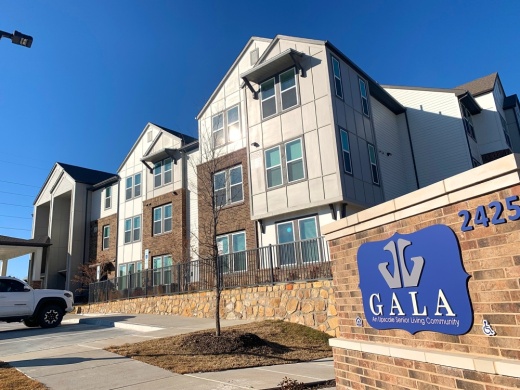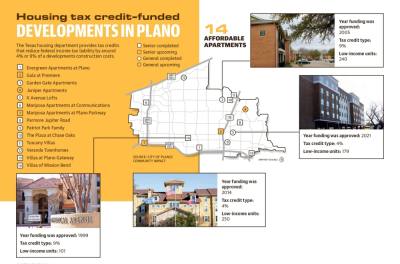The Texas Department of Housing and Community Affairs’ tax credit program allows participating developments to offset a portion of federal tax liability to provide affordable rental housing.
Plano City Council saw flaws in the city’s process and opted to put applications on hold through 2023.
“We want to make sure we have a process that really allows the city to do the due diligence it needs to do,” Plano City Manager Mark Israelson said.
For a development to be eligible for tax credits at the state level, the city must first provide a resolution of support or no objection regarding potential financing of the project.
Of the 14 Plano housing developments funded by the program, nine are senior living facilities.
The projects also have a maximum yearly income that ranges from $34,100 for a single person to rent a unit to $77,160 for a household of eight people.
“It is rent restricted, not rent controlled,” said Darren Smith, southwest region head of development at Pivotal, a developer that focuses on affordable housing. “You have to pay your rent—it’s not public housing—but it makes the rent affordable.”
Pivotal is the developer behind the K Avenue Lofts, one of Plano’s most recent housing tax credit-funded projects.
Smith said the development will help the area “thrive from an employment perspective,” by providing local housing to help fill jobs.
“There’s a need for workforce affordable housing all across North Texas, because the area has such an influx of folks coming in,” Smith said.
Why the program is changing
Plano officials want to make sure the order of approvals “aligns with other processes that go on within the city,” according to Israelson.
The existing process allows developers to apply for the housing tax credit program before securing needed zoning on a property.
“At least get zoning out of the way before anybody spends a whole bunch of money and time,” Plano City Council Member Rick Grady said. “It’s a better sequence for the developers, for the city, and it’s better for decision making.”
Grady also wants to give precedence to local developers when considering housing tax credit applications.
“We have a lot of developers in Plano that can be [called] on to do this type of thing,” Grady said. “And they care, because they’re in the community.”
Grady added that using local developers will be better for Plano’s economy.
“If my general partner is from Plano, and the management company is in Plano, the construction workers will be from around the area as well,” Grady said.
How the program functions
K Avenue Lofts receives funding from a 4% tax credit, which generates around 30% of a development’s equity. The state housing department also provides 9% tax credits, which generate around 70% of a development’s equity. The credits reduce federal income tax liability by approximately 4% or 9%.
Developers can apply for either credit, but the 9% tax credits are very competitive, according to Smith.
That is where the city comes in. A resolution of support from council will give a development more points in the state housing department’s application process—points that could decide whether a project is awarded funds.
“The more points you have when you go into the competition, the higher in the stack you get, which gives you a better chance to get awarded the grant,” Grady said. “That’s a really big deal.”
Affordable housing in Plano
The K Avenue Lofts received funding in 2021, and Smith—whose company is the developer for the project—said he is excited about the quality of the project as it nears completion.
Smith has worked to develop affordable housing for almost 30 years, and he added that maintaining quality of his projects is crucial.
“I look at K Avenue as one of the better developments that I’ve worked on,” Smith said. “If it doesn’t stay well-maintained... that would affect me on my next deal somewhere else.”
Smith said the development will help people who work in Plano but have to live outside of the city, as well as Plano residents in need of affordable housing.
Mimi Conner, Plano chapter lead for Lovepacs, has seen the number of Plano residents her organization helps in need rise from 400 to 2,500 since she started five years ago.
Lovepacs works with the school district to help provide meals for families in need.
“Because rent is going up, we are seeing families needing more assistance,” Conner said. “Even though they’re being fed at school, they’re struggling every single day.”
Grady said he believes reworking the housing tax credit application process will help meet that need, not hinder it.
“There are all kinds of avenues of building affordable housing—that won’t stop,” he said. “Once the program is redesigned and implemented, then I think developing affordable housing will pick right back up.”






